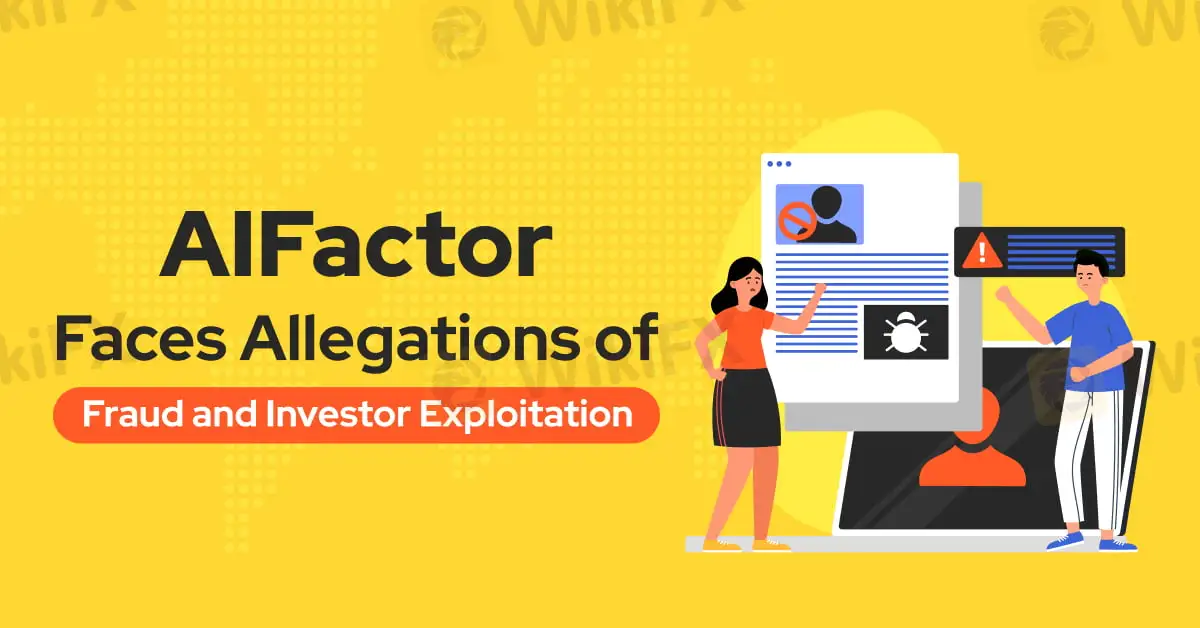简体中文
繁體中文
English
Pусский
日本語
ภาษาไทย
Tiếng Việt
Bahasa Indonesia
Español
हिन्दी
Filippiiniläinen
Français
Deutsch
Português
Türkçe
한국어
العربية
AIFactor Faces Allegations of Fraud and Investor Exploitation
Abstract:In the fast-paced world of online trading, selecting a trustworthy broker is essential. AIFactor, an alleged scam broker, has recently raised red flags among investors due to its suspicious activities and lack of transparency.

In the fast-paced world of online trading, selecting a trustworthy broker is essential. AIFactor, an alleged scam broker, has recently raised red flags among investors due to its suspicious activities and lack of transparency. Despite its polished presentation and claims of leveraging artificial intelligence (AI) for optimized trades, closer scrutiny reveals numerous concerns about its operations, regulatory status, and treatment of users.
AIFactor presents itself as an advanced trading platform, advertising high returns with minimal effort through AI-driven algorithms. While these claims appeal to novice traders, it is believed that the promises of easy profits are exaggerated and intended to lure in unsuspecting investors. The platform‘s marketing relies heavily on these claims, but there is little evidence to support them. Instead, AIFactor’s primary objective appears to be extracting deposits from users without providing real trading services.
One of the most concerning aspects of AIFactor is its lack of regulatory oversight. The platform does not disclose any affiliation with recognized financial authorities, raising suspicions about its compliance with industry regulations. Unregulated brokers are free to manipulate trades and withhold funds without facing legal consequences, which could be the case with AIFactor.

Adding to these concerns, Spains financial regulator, the CNMV, has issued a warning about AIFactor, suggesting that the broker may be engaging in illegal activities. The absence of clear regulatory information is a significant red flag, indicating that AIFactor may be operating outside of legal frameworks designed to protect investors.
Numerous users have reported difficulties withdrawing funds from AIFactor. After depositing money and seeing what appeared to be profitable trades, many investors have found their withdrawal requests denied or delayed. This common tactic among fraudulent brokers allows them to block access to funds after extracting as much money as possible from users.
Additionally, AIFactor has been accused of freezing user accounts without explanation. In many cases, traders are told that additional verification is required or that unexpected fees must be paid. Even after meeting these demands, most users remain unable to access their funds, leaving them with no recourse.
To disguise its suspicious activities, AIFactor is suspected of posting fake positive reviews on online platforms. These fabricated testimonials often praise the platform‘s AI system and customer service, but further analysis suggests they lack credibility. In contrast, legitimate review sites are filled with complaints about AIFactor’s unethical practices, including blocked withdrawals, poor customer service, and unfulfilled promises.
AIFactors handling of sensitive personal information is another concern. During the registration process, users must provide government-issued IDs, proof of address, and bank account details. It is feared that AIFactor could exploit this data for identity theft or other illegal purposes, putting investors at risk beyond financial loss.
In summary, AIFactors lack of regulation, withdrawal issues, and fabricated reviews paint a concerning picture. Despite its polished appearance and promises of easy profits, there are significant risks involved in engaging with this platform. Investors are advised to thoroughly research brokers before committing funds and prioritize those that are regulated by recognized authorities.

Disclaimer:
The views in this article only represent the author's personal views, and do not constitute investment advice on this platform. This platform does not guarantee the accuracy, completeness and timeliness of the information in the article, and will not be liable for any loss caused by the use of or reliance on the information in the article.
Read more

Will Inflation Slow Down in the New Year 2025?
Will inflation slow down in 2025? Experts weigh in on projections, economic policies, and potential impacts, offering insights into what the new year may hold.

New Zealand's FMA Warns Against "YouTube Crypto Investment Scam"
The Financial Markets Authority (FMA), New Zealand's financial regulator, warns individuals against investment scams that use YouTube channels to promote fraudulent cryptocurrency investment firms/websites. The authority explained on its official website how the YouTube cryptocurrency scam works, providing a step-by-step guide to help people recognize and avoid it. Read HOW THE SCAM WORKS and BE SAFE.

Trading is an Endless Journey
Every trader dreams of quick success, but rushing the process often leads to mistakes. It’s easy to get swept up in the excitement of winning trades or discouraged by unexpected losses. The truth is, mastering the emotional side of trading can be even more important than understanding market analysis or strategies.

How to Know if the Market is Correcting or Reversing?
In trading, distinguishing between a market correction and a market reversal is crucial for making sound decisions. Misjudging one for the other can lead to missed opportunities or significant losses. While both involve price movements, their causes, duration, and implications differ substantially. Understanding these differences can help traders improve their strategies and adapt to market conditions effectively.
WikiFX Broker
Latest News
RM62k Lost Investment Scam After Joining XRP Community Malaysia on Telegram
Victims of Financial Fraud in France Suffer Annual Losses of at Least €500 Million
What Impact Does Japan’s Positive Output Gap Have on the Yen?
Macro Markets: Is It Worth Your Investment?
Trading is an Endless Journey
SEC Warns on Advance Fee Loan Scams in the Philippines
Russia Turns to Bitcoin for International Trade Amid Sanctions
Rs. 20 Crore Cash, Hawala Network, Income Tax Raid in India
Hong Kong Stablecoins Bill Boosts Crypto Investments
BEWARE! Scammers are not afraid to impersonate the authorities- France’s AMF said
Currency Calculator


